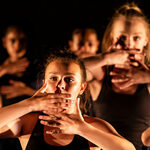Racial Stereotypes: how far have we come?
The Jenkins Orphanage, Charleston by Emily Needle
The end of the nineteenth century in Charleston; a rise in crime. Assaults, robberies, prostitution, illegal trafficking and gambling, with fights and stabbings frequent. Bootlegging was the only option for many poor African-Americans who could not afford to pay for expensive goods. Wealthy African-Americans often requested the protection of police because they were afraid to leave their homes in case they were broken into by members of their own race.
‘Fear of black crime helped a black Baptist minister, Daniel J. Jenkins, persuade the City Council to support the orphanage he had recently founded. The ingenious Reverend Mr. Jenkins argued that he was keeping potential juvenile offenders off the streets and making ”breadwinners out of beggars and loafers,” and in 1897 the city council voted $250 to support the fifty-four ”colored orphans” lodged at the Jenkins orphanage. The News and Courier believed he would provide a place where ”the small…thieves, crap shooters, and razor pushes could…learn an honest trade,” and annually the city government continued to support the orphanage.’ (quoted in Charleston! Charleston! The history of a Southern City (1989) by Walter J. Fraser
I found it touching that Jenkins, an African-American himself, had to lie and say things he didn’t agree with to get funding from white people for his orphans. The city donated around $1,000 annually to Jenkins, yet the upkeep of the orphanage cost $20,000 per year. In 1912, donations from the North and collections by the Jenkins orphanage band exceeded the city’s donations ten-fold. Unsurprisingly, the two orphanages for white children in Charleston were given much more money from the city.
On a slightly more positive note, out of the 73 lynchings that took place in the state of South Carolina between 1882 and 1900, none were in Charleston. This is not to say that the city wasn’t highly segregated and unequal.
http://bit.ly/1t5WL8c Read Gary Younge, Guardian journalist on racism in the USA today.
Emily Needle is a History student at Newcastle University
This research comes from work I did over the summer as part of Newcastle University’s vacation scholarship scheme. I spent 5 weeks in America travelling down the East coast, looking at the relationship between the development of Jazz music and race relations in the US south between 1890 and 1920, and I found some very exciting and powerful links. This project will form the core of my undergraduate dissertation this year, and I will be updating my research blog throughout the process at http://www.fromragsthroughracetoragtime.blogspot.co.uk




